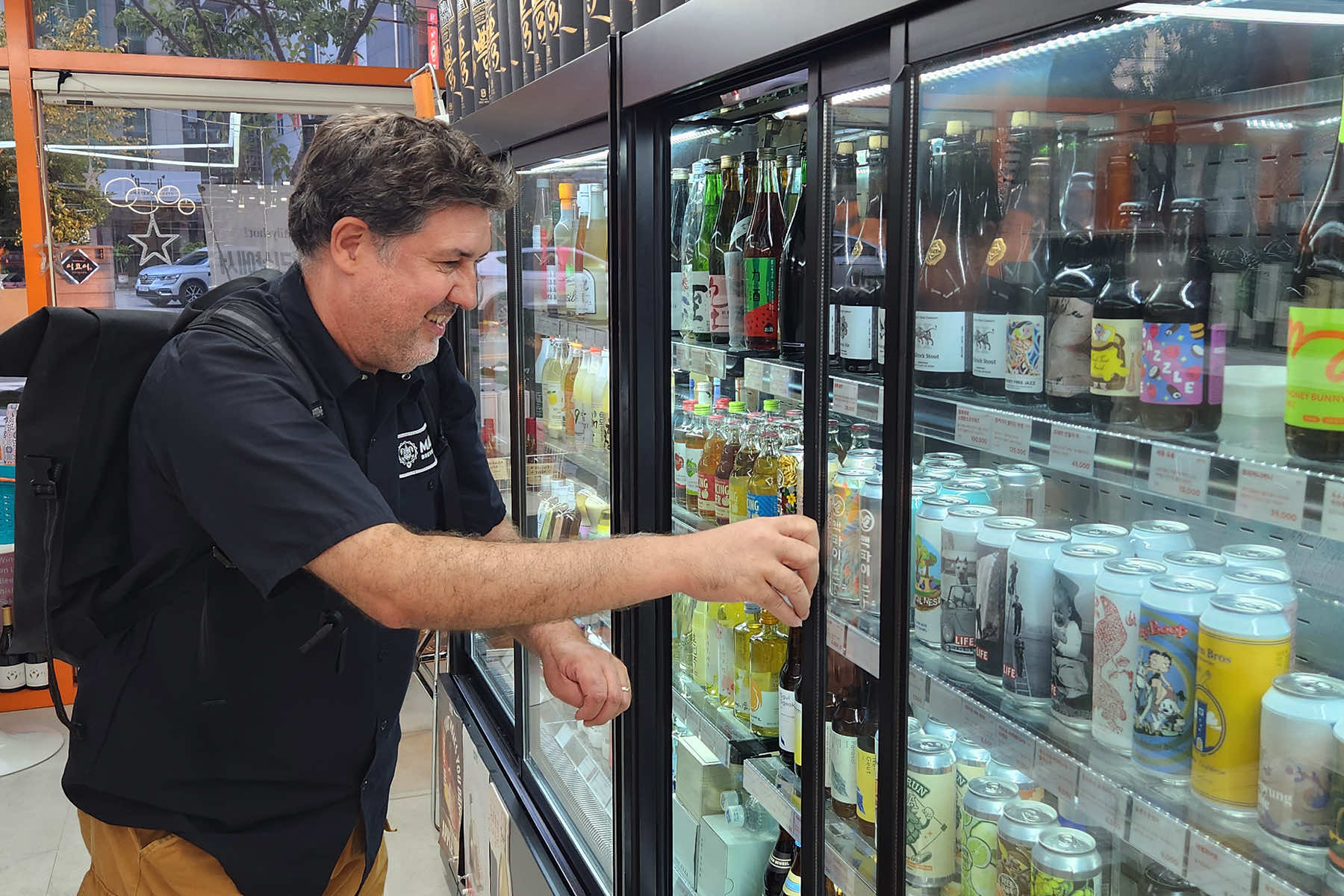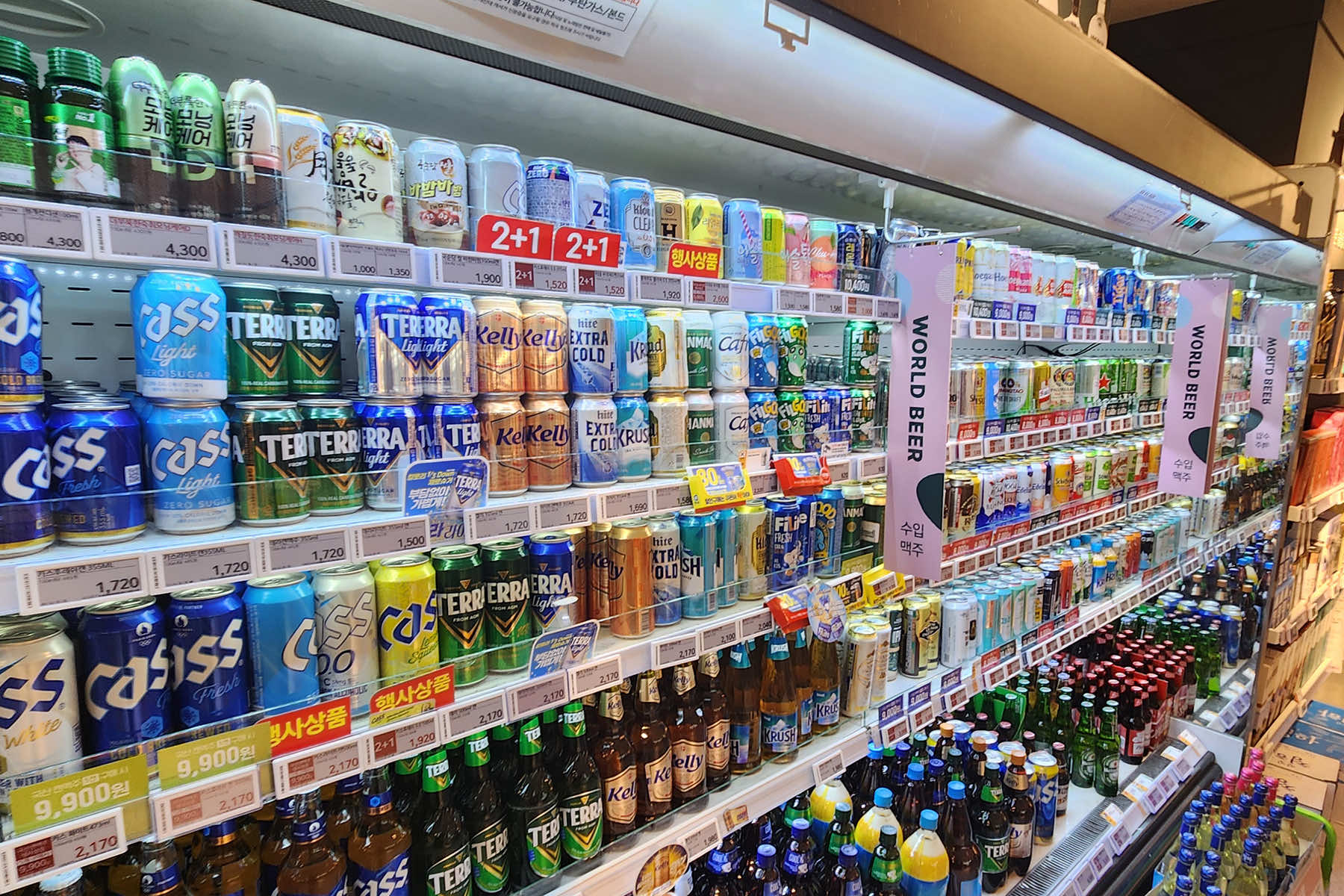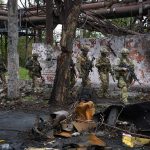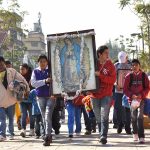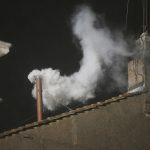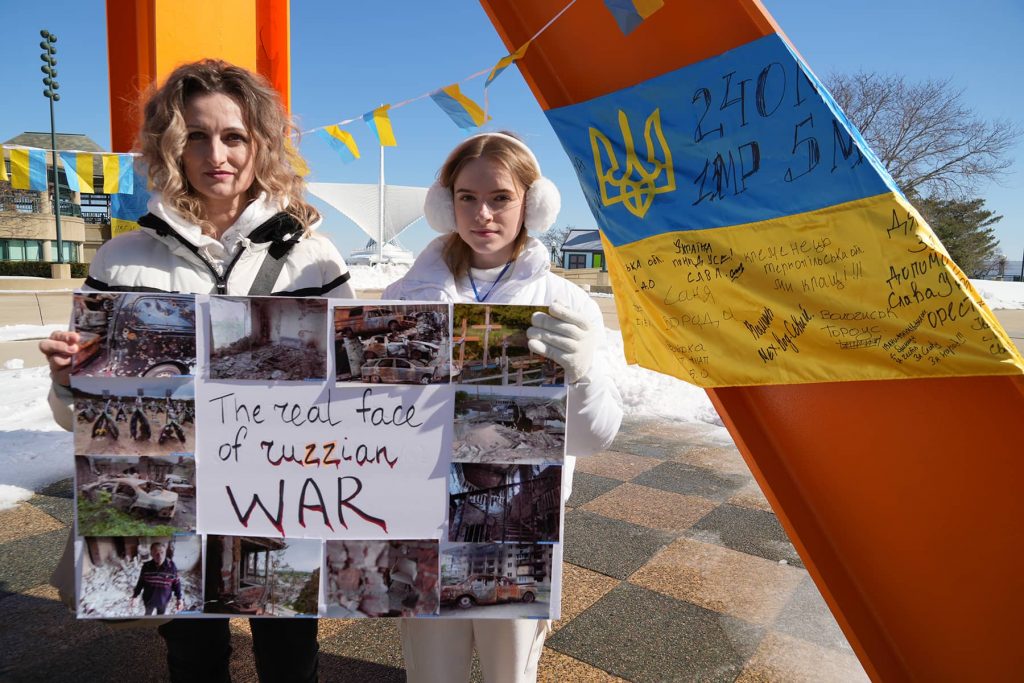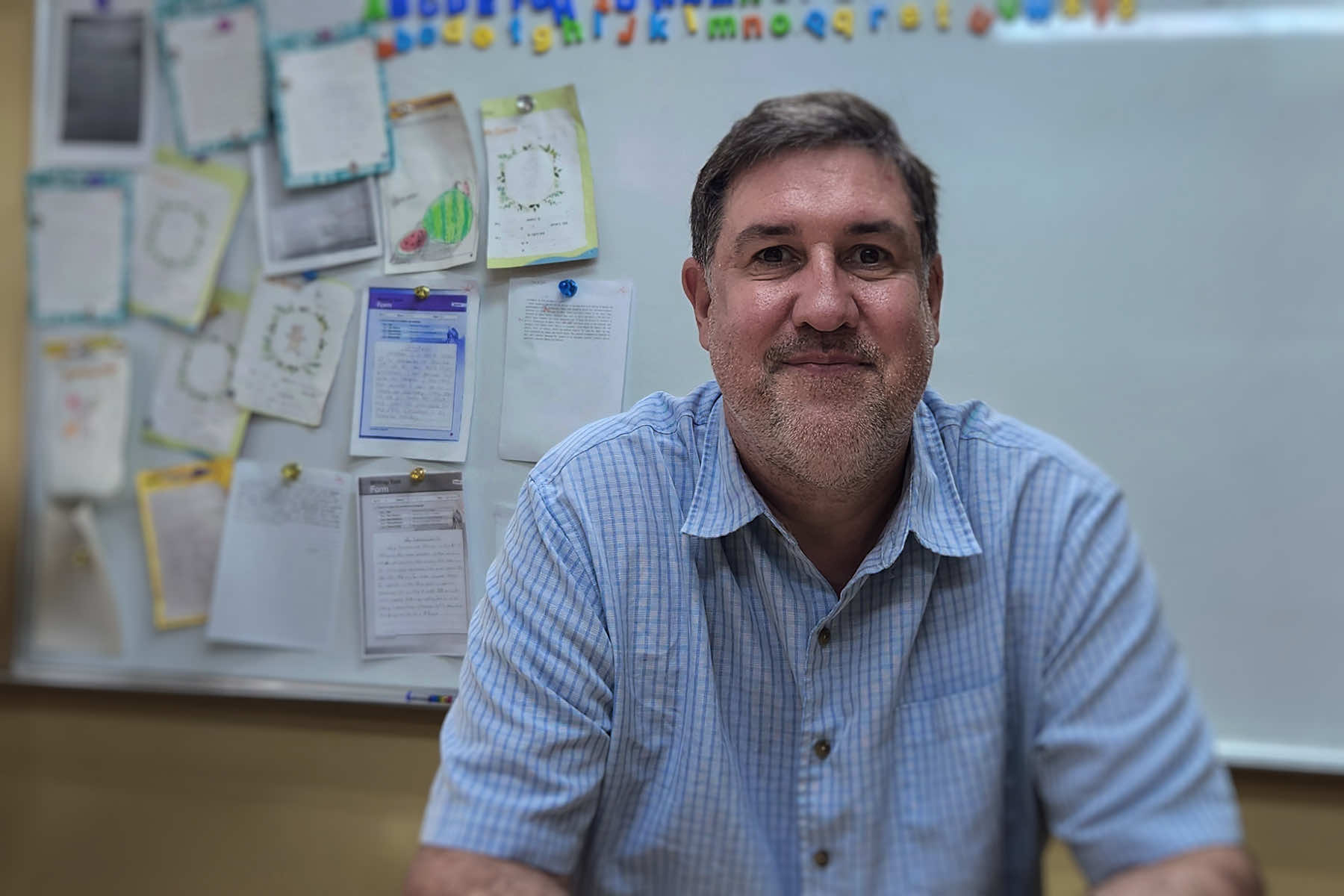
As a Milwaukee native who grew up enjoying frozen custard and Brewers baseball games with his father, moving to South Korea in 2009 came with some adjustments for Christopher Wing. He adapted quickly and embraced the culture of his adopted home, while also remaining deeply connected to his roots back in the Brew City.
Wing spent his early formative years in Milwaukee. After completing a college education, his career took him into the world of design where he worked for various firms in the area. However, he had a desire for something more meaningful than what was available in Milwaukee at that time.
“I decided to move to San Francisco, a town I had always loved,” said Wing. “I worked as an Art Director and Creative Director there for about 10 years, but started to feel that I wasn’t really productive. I was doing well financially, but wasn’t really helping society.”
That realization came at a crossroads moment of his life. It inspired him to contemplate a different path, one that would eventually lead him halfway around the world.
“I considered a few options, but decided to teach English in Korea. I had originally planned to live here for a year, and then teach in another country, and travel around Asia,” said Wing. “However, I was introduced to a woman through mutual friends, and we ended up getting married.”
When Wing arrived in South Korea on November 27, 2009, it marked the beginning of a new chapter for him that was filled with both excitement and challenges. His early exposure to the country was a whirlwind of new sights, tastes, and customs.
“One of my first experiences in Korea was going to Sangnam-dong, the local nightlife area, and eating samgyeopsal (삼겹살 pork belly) and drinking soju (소주 rice alcohol). You cook the meat at your table, and wrap it in lettuce with onions and a spicy pepper sauce,” said Wing. “After that, we went to a noraebang (노래방 a private singing room). It was fantastic, but completely foreign to me.”
It helped that Wing had an abundant fascination with the culture. However, it did not prevent his eventual encounters with difficulties that all foreigners experience at some point when moving to a different country. For Wing, his frustration was not so much the language barrier but the complexities of speaking at a native level.
“I know a lot of vocabulary, but the grammar is extremely difficult for me to grasp,” said Wing. “I have a lot of respect for foreigners who can learn it. I also have a lot of respect for Koreans who learn English, because as difficult as Korean is for me, English must be that difficult for Koreans.”
Fortunately, it has not been an overwhelming challenge and is more than outweighed by the joys of living in South Korea. Wing remains very enthusiastic about the aspects of his life in South Korea, a country that he has developed great affection for.
“There’s so much to love about South Korea that it’s hard to even list it all. The food is incredible, the country’s natural beauty is breathtaking — mountains, streams, wilderness, and beaches are all around. Its location makes it easy to travel to various Asian destinations, and I appreciate the absence of personal firearms, the efficiency of the KTX train system, and the affordability of healthcare.”
Being married to a Korean national does require him to navigate some social idiosyncrasies, but they are also common to most intercultural relationships. Wing said he was very thankful for the understanding and mutual respect that have defined his situation.
“We do pretty well at figuring things out, but sometimes the differences can be pretty vast. I think it took my wife a while to relax around my parents. Korean daughters-in-law have long been subservient to their mothers-in-law, although that is changing,” said Wing. “So, my wife felt obligated to cook and clean at my parent’s house, until my mom finally told her she had to ‘Sit down and relax!’ I’ve been extremely lucky that my wife’s family has really been welcoming and kind to me.”
As someone with a background in Milwaukee for being a home brewer, Wing’s journey through South Korea took him into some familiar territory. His interest in making small batches of beer led him to become involved in the local craft beer scene in the city of Changwon. His role at Rami Brewing allowed him to utilize his creative talents and expand his passion for making beer.
“I was the Head Brewer at Rami Brewing, where I collaborated with the owner to find the ideal location, set up the brewery, and create our beer recipes,” said Wing. “I was heavily involved in ensuring we produced high-quality beers that stood out in the local craft beer market.”
Even after stepping away from Rami Brewing, Wing continues to nurture his love for brewing as a home brewer. However, he said that the brewing industry in South Korea came with its own set of challenges.
“I am still a home brewer, and still looking for another brewery opportunity. The biggest advantage of brewing in Korea is that the industry is still growing, and Korean brewers use a lot of local ingredients for their beers. So there are amazing possibilities for flavors and styles,” said Wing. “The biggest challenges are getting newer materials – certain varieties of newer hops and yeasts, and brewing and fermenting equipment. We do have a few shops that sell ingredients, but they also struggle to import new items.”
For Wing, beer has been both a professional pursuit and also a cultural bridge between his two homes. He saw alcohol, particularly beer, as a way to connect communities across the globe. His experiences have also shown him that regardless of the differences, there are common threads that unite people. Especially when people can share a drink together.
“One of the first people I met in the Korean beer community was an importer who was shipping Lakefront Brewery products to Korea,” said Wing. “I’ve met a huge variety of brewers and beer drinkers in Korea and, just like in Milwaukee, they’ll talk your ear off about their brewing methods and their favorite breweries. I would like to see someone in Milwaukee start making makgeolli – a Korean style of rice wine. I think people in Milwaukee would love it.”
Makgeolli (막걸리) is a traditional Korean drink known for its milky, off-white color and light fizz. It has a smooth, slightly thick texture with a flavor that balances sweetness, tanginess, bitterness, and a hint of astringency. With a modest alcohol content of six to nine percent, makgeolli is often shared among friends rather than being considered a strong liquor.
Living in South Korea during significant events has given Wing a unique perspective on the country’s place in the world. While he did not have a front-row seat for the 2018 Winter Olympics in Pyeongchang, it was hard to escape the news about or impact of the international games.
“I live pretty far away from where the Olympics were held, but I did have friends who went and they said the venues were quite nice. There was a lot of pride in Korea at being able to host the Olympics, and to show this country to the world,” said Wing. “I think a lot of people here were also very proud at how far along Korea has come since the 1988 games, both in technology and culture.”
When COVID-19 struck a few years later, Wing did witness firsthand how South Korea’s response to the deadly pandemic differed from that of other countries.
“Although the ongoing pandemic was horrible, Korea did a pretty good job taking care of citizens and businesses. We did have lockdowns, and we had to close our English academy for about a month,” said Wing. “We were compensated for our business losses by the government, and given low-interest loans to help restart our business after the lockdowns.”
He also thought highly of the country’s healthcare system during the crisis. There was a level of efficiency that did not appear to be emulated back home in the United States.
“Testing centers were set up throughout the city, and vaccines were given through the healthcare system,” said Wing. “A national phone app was provided to show you had taken the vaccine, and you were not allowed into restaurants and other places if you hadn’t received them. Almost everyone wore masks.”
Mask-wearing was already culturally accepted in South Korea, related to health conditions. If a person was sick, they wore a surgical-style medical mask to protect the health of others around them. That philosophy proved to be quite the opposite of Wisconsin, where elements of the public protested against the most basic mask requirements.
Because Wing and his wife live in the southern part of South Korea and are relatively far from the Korea Demilitarized Zone (DMZ), he never worried much about North Korean threats. However, that did not stop others back home in Milwaukee from being overly concerned.
“I remember a few days after I moved here, I got a worried call from my parents – there had been some shooting across the DMZ. But no one in Changwon seemed worried, and life continued as normal,” said Wing. “Most of the foreigners I know follow a simple rule – watch the local Koreans. If they’re worried, you should be, too. But until now, we haven’t had any problems.”
Despite a physical distance of roughly 6,500 miles, Wing has made it a priority to stay connected to his roots in Milwaukee. Technology has played an important role, allowing him to maintain open and frequent lines of communication with family and friends.
“I chat with my family on Skype once or twice a week, and my wife and I try to visit once a year – although that was impossible during COVID. Airplane tickets have really gone up in price, so we couldn’t make the trip this year. But we’ll go next summer,” said Wing. “I keep track of Milwaukee friends through Facebook and Instagram. I also wear my Brewers cap here in Changwon, to show my hometown pride.”
Wing said that most people in Changwon know about Milwaukee for three reasons: The Milwaukee Brewers, Harley-Davidson, and Miller Beer.
“Usually, when describing Milwaukee to people in Changwon, I tell them about snow days in school. This region only gets one or two days of snowfall per year, so the idea of a Milwaukee winter is beyond their experience,” said Wing. “I also talk about the cheese section at the supermarket, and about how much I enjoyed my years at MPS, from Lloyd Street to 8th Street to Riverside University High School.”
When he talks about Korea to friends in Milwaukee, he usually details a list of Korea’s amazing food, the good healthcare, and how much there is to see and do in the country.
“Mostly, I try to get them to come visit, and a few have beers. Busan, especially in the coastal areas, is pretty unique in Korea. I think the city tends to be a bit more liberal, with more foreigners than other parts of Korea, except Seoul,” said Wing. “People from Changwon go to Busan for culture, and to get away from the ‘normal’ life for a weekend.”
Having spent a decade and a half in South Korea, Wing tries to find opportunities to share his insights with those back home in Milwaukee. He felt many of the best aspects of South Korea tend to be overshadowed by the social popularity of food, K-dramas, and K-pop. He encouraged anyone in Milwaukee to consider teaching in Korea as a way to gain unique life experiences.
“It is a challenge to be sure, and the money isn’t as good as in other countries, but I think it is a great opportunity and a way to see another culture that is quite unique,” said Wing. “In addition, Korea is an extremely safe country – no one owns guns, and crime is relatively low.”
South Korea is also a particularly mountainous country, and Wing said there were many amazing camping opportunities, along with backpacking. As a tourist destination, Jeju Island had amazing beaches and many popular attractions.
“A lot of Koreans, especially younger Koreans in large cities, speak English. You can usually find someone who is willing to help you find where you’re going,” said Wing. “Also, getting around in the larger cities is both easy and cheap using the subway systems.”
And for a home brewer, no trip to South Korea would be complete without an experience related to beer. The country has many famous breweries, including Magpie, Craft Brothers, Seoul Gypsy, Seoul Brewing, Galmegi, and Nomadic. Although the peak of the Korean craft beer boom has passed, there are still plenty of good options available for beer enthusiasts.
“Exploring craft breweries remains one of the best ways to immerse yourself in the local culture and connect with Koreans who share a passion for good beer,” added Wing. “What better place to meet the local people?”
Christopher Wing, and Moomusician, Tong Stocker, Amin Korea, Kim Jin Gyu, Sanga Park, Busan Oppa (via Shutterstock)
- Exploring Korea: Stories from Milwaukee to the DMZ and across a divided peninsula
- A pawn of history: How the Great Power struggle to control Korea set the stage for its civil war
- Names for Korea: The evolution of English words used for its identity from Gojoseon to Daehan Minguk
- SeonJoo So Oh: Living her dream of creating a "folded paper" bridge between Milwaukee and Korean culture
- A Cultural Bridge: Why Milwaukee needs to invest in a Museum that celebrates Korean art and history
- Korean diplomat joins Milwaukee's Korean American community in celebration of 79th Liberation Day
- John T. Chisholm: Standing guard along the volatile Korean DMZ at the end of the Cold War
- Most Dangerous Game: The golf course where U.S. soldiers play surrounded by North Korean snipers
- Triumph and Tragedy: How the 1988 Seoul Olympics became a battleground for Cold War politics
- Dan Odya: The challenges of serving at the Korean Demilitarized Zone during the Vietnam War
- The Korean Demilitarized Zone: A border between peace and war that also cuts across hearts and history
- The Korean DMZ Conflict: A forgotten "Second Chapter" of America's "Forgotten War"
- Dick Cavalco: A life shaped by service but also silence for 65 years about the Korean War
- Overshadowed by conflict: Why the Korean War still struggles for recognition and remembrance
- Wisconsin's Korean War Memorial stands as a timeless tribute to a generation of "forgotten" veterans
- Glenn Dohrmann: The extraordinary journey from an orphaned farm boy to a highly decorated hero
- The fight for Hill 266: Glenn Dohrmann recalls one of the Korean War's most fierce battles
- Frozen in time: Rare photos from a side of the Korean War that most families in Milwaukee never saw
- Jessica Boling: The emotional journey from an American adoption to reclaiming her Korean identity
- A deportation story: When South Korea was forced to confront its adoption industry's history of abuse
- South Korea faces severe population decline amid growing burdens on marriage and parenthood
- Emma Daisy Gertel: Why finding comfort with the "in-between space" as a Korean adoptee is a superpower
- The Soul of Seoul: A photographic look at the dynamic streets and urban layers of a megacity
- The Creation of Hangul: A linguistic masterpiece designed by King Sejong to increase Korean literacy
- Rick Wood: Veteran Milwaukee photojournalist reflects on his rare trip to reclusive North Korea
- Dynastic Rule: Personality cult of Kim Jong Un expands as North Koreans wear his pins to show total loyalty
- South Korea formalizes nuclear deterrent strategy with U.S. as North Korea aims to boost atomic arsenal
- Tea with Jin: A rare conversation with a North Korean defector living a happier life in Seoul
- Journalism and Statecraft: Why it is complicated for foreign press to interview a North Korean defector
- Inside North Korea’s Isolation: A decade of images show rare views of life around Pyongyang
- Karyn Althoff Roelke: How Honor Flights remind Korean War veterans that they are not forgotten
- Letters from North Korea: How Milwaukee County Historical Society preserves stories from war veterans
- A Cold War Secret: Graves discovered of Russian pilots who flew MiG jets for North Korea during Korean War
- Heechang Kang: How a Korean American pastor balances tradition and integration at church
- Faith and Heritage: A Pew Research Center's perspective on Korean American Christians in Milwaukee
- Landmark legal verdict by South Korea's top court opens the door to some rights for same-sex couples
- Kenny Yoo: How the adversities of dyslexia and the war in Afghanistan fueled his success as a photojournalist
- Walking between two worlds: The complex dynamics of code-switching among Korean Americans
- A look back at Kamala Harris in South Korea as U.S. looks ahead to more provocations by North Korea
- Jason S. Yi: Feeling at peace with the duality of being both an American and a Korean in Milwaukee
- The Zainichi experience: Second season of “Pachinko” examines the hardships of ethnic Koreans in Japan
- Shadows of History: South Korea's lingering struggle for justice over "Comfort Women"
- Christopher Michael Doll: An unexpected life in South Korea and its cross-cultural intersections
- Korea in 1895: How UW-Milwaukee's AGSL protects the historic treasures of Kim Jeong-ho and George C. Foulk
- "Ink. Brush. Paper." Exhibit: Korean Sumukhwa art highlights women’s empowerment in Milwaukee
- Christopher Wing: The cultural bonds between Milwaukee and Changwon built by brewing beer
- Halloween Crowd Crush: A solemn remembrance of the Itaewon tragedy after two years of mourning
- Forgotten Victims: How panic and paranoia led to a massacre of refugees at the No Gun Ri Bridge
- Kyoung Ae Cho: How embracing Korean heritage and uniting cultures started with her own name
- Complexities of Identity: When being from North Korea does not mean being North Korean
- A fragile peace: Tensions simmer at DMZ as North Korean soldiers cross into the South multiple times
- Byung-Il Choi: A lifelong dedication to medicine began with the kindness of U.S. soldiers to a child of war
- Restoring Harmony: South Korea's long search to reclaim its identity from Japanese occupation
- Sado gold mine gains UNESCO status after Tokyo pledges to exhibit WWII trauma of Korean laborers
- The Heartbeat of K-Pop: How Tina Melk's passion for Korean music inspired a utopia for others to share
- K-pop Revolution: The Korean cultural phenomenon that captivated a growing audience in Milwaukee
- Artifacts from BTS and LE SSERAFIM featured at Grammy Museum exhibit put K-pop fashion in the spotlight
- Hyunjoo Han: The unconventional path from a Korean village to Milwaukee’s multicultural landscape
- The Battle of Restraint: How nuclear weapons almost redefined warfare on the Korean peninsula
- Rejection of peace: Why North Korea's increasing hostility to the South was inevitable
- WonWoo Chung: Navigating life, faith, and identity between cultures in Milwaukee and Seoul
- Korean Landmarks: A visual tour of heritage sites from the Silla and Joseon Dynasties
- South Korea’s Digital Nomad Visa offers a global gateway for Milwaukee’s young professionals
- Forgotten Gando: Why the autonomous Korean territory within China remains a footnote in history
- A game of maps: How China prepared to steal Korean history to prevent reunification
- From Taiwan to Korea: When Mao Zedong shifted China’s priority amid Soviet and American pressures
- Hoyoon Min: Putting his future on hold in Milwaukee to serve in his homeland's military
- A long journey home: Robert P. Raess laid to rest in Wisconsin after being MIA in Korean War for 70 years
- Existential threats: A cost of living in Seoul comes with being in range of North Korea's artillery
- Jinseon Kim: A Seoulite's creative adventure recording the city’s legacy and allure through art
- A subway journey: Exploring Euljiro in illustrations and by foot on Line 2 with artist Jinseon Kim
- Seoul Searching: Revisiting the first film to explore the experiences of Korean adoptees and diaspora





